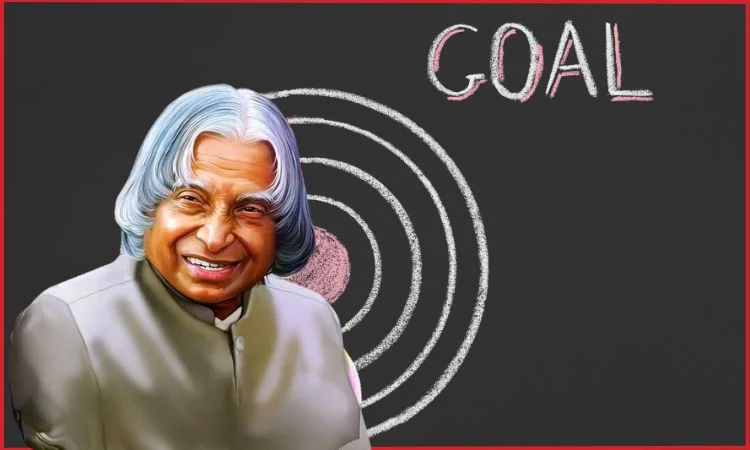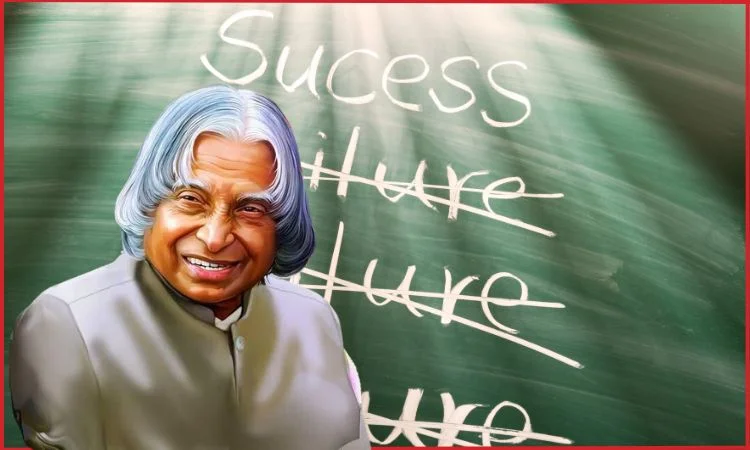At the time when he was the former president of India, APJ Abdul Kalam was much more popular not just for his credentials as a scientist but for the fact that he was an exemplary educator and mentor. Inspiringly oratorial in personality, this was an individual with an appeal across ages. Being a student, there is much one can learn from his life. Applying these valuable lessons to ourselves, we’ll surely become a better student, as well as a better human being.

Image credit: Educatedtimes.com
I am introducing you to four great lessons from the life of APJ Abdul Kalam: to be a good student and also to be a good human being. From hard work, perseverance, and humility to dreams, in his wisdom, Kalam gives us practical advice. So join us in this inspiring endeavour, and discover how to incorporate this into your life!
Introduction to APJ Abdul Kalam and His Glory
APJ Abdul Kalam, well-known as the People’s President, was an eminent visionary leader, a renowned scientist, and a dedicated educator, always raising the world in legacy. Born on October 15, 1931, in Rameswaram, Tamil Nadu, India, Kalam’s ascent from humble beginnings to being revered as one of the most dignified personalities in India is nothing short of an inspiration.

Source: Google Images
Besides all these professional qualities, Kalam was also known for his values of humility, simplicity, and integrity. He could connect to any set of individuals from every stratum of society. People called him a good orator, motivator, and wise man for the simple reason that his words were capable of instilling hope and positivity in many hearts, leaving behind indelible imprints in the innumerable souls he encountered.
There is great scope for learning four important life lessons from the inspirational life example and teachings of APJ Abdul Kalam for students. If they imbibe this, they will learn something that will take them to success in their studies, shaping their characters and turning them into good citizens in society.
Must Read: 10 Indian Women Scientists Inspiring the World
Important Lessons Given By APJ Abdul Kalam
Kalam is known for their unique skills and intelligence in science, specifically space science. His extraordinary skills and contribution to the nation are remarkable, and we remember him as the President of India. Here are some of the life lessons that should be learned.
Lesson 1: Dream big and set ambitious goals
His life is an example in the making, epitomizing how hard work, determination, and unyielding pursuit of knowledge can lead someone to their heights. He initiated his career as a scientist with the Indian Space Research Organisation (ISRO), and the scientist, indeed, was an influential member of the team that put India’s first SLV-III indigenous Satellite Launch Vehicle into place. His revolutionary contributions to the space and missile programs of the country earned him the title “Missile Man of India.”.
However, the greatest legacy of Kalam lies not in his scientific feats. He believed education to be the saviour of nations, and students, in his passionate mind, were the very foundation of a brighter future. With all his days on earth, he equipped young minds to dream big, aim high, and reach excellence.

Kalam realized his humble beginnings were no limitation on the height of his dreams. He was an emboldened advocate of dreams and ambitious goals, for he was a great scientist and a former president of India.
Dreams are considered to drive passions in that they bring out the potential needed for performing extraordinary things, according to Kalam. His famous exhortation goes like this: “Dream, dream, dream. Dreams transform into thoughts, and thoughts result in action,” to highlight the effectiveness brought by dreaming. Students should set their goals higher than what they think they can achieve, thus sometimes getting above the limits and accomplishing something impressive.
Kalam’s journey from a small-town boy to a great scientist and national leader exhibits how dreaming has to be pursued relentlessly. He shaped India’s space and missile programs and had dreams for a dreamed India, where she would be prospered more with science and education.
Kalam’s Dreams and Aspirations
Kalam’s vision for the majority of dreaming went beyond clouds. He envisaged India becoming an empowered nation with as much strong educational and technological support as possible to touch national development. He even encouraged students to aspire high and use their knowledge for the good of society. Life shows that success is not merely for himself but also for development in society.
How Students Can Learn from This Lesson
Perseverance: While he experienced failures, including rejection from the Indian Air Force, he never ceased trying. A student could learn from such resilience that failure can be assumed to be a source of motivation to keep pursuing one’s goals.
Passionate for Learning: Kalam was an eternal learner who esteemed knowledge above the rest. Curiosity can be fostered in a student beyond the texts.
Civility: Even after flying to great heights, Kalam was down to earth. Students can also practice humility by respecting others, listening to them, and being open to different perspectives.
Goal setting: Kalam suggested that one should set clear and lofty goals. This can be taken by students as the learning use of creating action plans towards their academic and personal growth; this keeps students on track for motivation towards their goals.
Kalam has a lot to teach as far as dreaming big, perseverance, and living one’s life to make a difference. Application of these principles would go a long way in enabling the students to reach their full potential in their success journey.
Lesson 2: Embrace Failure as a Stepping Stone to Success
Students learn from APJ Abdul Kalam that failing need not be the end of the career, for it is only a stepping stone to success. Kalam had gone through well many forms of setbacks in his lifetime, but he never diverted from the goals he had set. He rather considered failing as a part of the learning process and an opportunity for growth.

Kalam saw failure not as an end but as a rich source of learning and improvement. Hence, when embraced, failure helps students grow resilience, perseverance, and positive thinking. Mistakes are not failures; rather, they are stepping stones to more significant achievements.
The Failures of Kalam and What He Did to Change Them into Opportunities
Numerous instances in Kalam’s life prove that failure can turn out to be a stepping stone to success. One such incident is when, after aspiring to become a pilot, the Indian Air Force rejected him. This did not stop him from being down when this happened; he changed the course of his career and became one of the major scientists in India. Taught the students what it is to have perseverance and be resilient by bouncing back from such disappointments and turning them into opportunities.
Also, this story reminds one about the event of humility because, no matter how many laurels he had on his name, Kalam kept his feet on the ground and did not let success swamp him from learning and improving continuously.
Resilience and Perseverance to Students
Resilience and perseverance are the prime qualities that students are supposed to possess. Just as his successes and failures, so will their lives. Poor exam results or being rejected can cause a setback, and this is where perseverance comes into play. As evident in this saying, “Failure will never overtake me if my determination to succeed is strong enough,” this tells the value of resilience.
Resilience provides students with a fighting chance to recover from the setback while perseverance
Lesson 3: Value Hard Work and Dedication
There lived A. P. J. Abdul Kalam, the “Missile Man of India.” He was a living example of the value of hard work coupled with dedication, besides the glory of his recognition. His life stands as a testament to students that success does not come on a platter but comes through consistent labour and determination.

Kalam, in his usual way of quoting himself, said, “Dream, dream, dream. Dreams transform into thoughts, and thoughts result in action.” This masthead captures so well the ingredient of action for it to become a reality, as he saw it. He understood the success achieved by pushing out of the zone of comfort through commitment and persistence.
It portrays how hard work and devotion conquer every type of hindrance, from that little village to the President of India. They are hard lessons from the work culture of these personalities that teach students to concentrate on effort rather than shortcuts for consistent time and discipline in excellence.
Kalam’s Work Ethic and Commitment
Kalam was influenced by his work ethic due to his passion towards work aside from his concern for society. No matter how many hurdles came in, he would remain focused towards his goals with discipline and consistency. His routine comprised an early rise followed by prioritizing the tasks he had set in his mind, which led to the prosperity he enjoyed.
Not because of selfish reasons, but because his ambition was based on a greater cause. That sense of purpose—his helping India emerge as a scientific power and the empowerment of the youth—ultimately kept him hooked to discipline and mission. Students will have a way to copy this tradition by enriching their goals with a bigger picture that contributes to the greater good.
Practical Steps to Creating a Strong Work Ethic
Clearly Define Goals: Draw your short-term and long-term goals; break them down into smaller and shorter tasks to develop an action plan of how you will achieve those. You will now have a clear direction and motivation.
Prioritize and Manage Time: You now have a clear understanding of your top priority tasks.
Cultivate Persistence: Accepting that setbacks are part of the journey. Learn from mistakes, adapt, and keep moving forward. He has developed resilience and can bounce back stronger from challenges.
Continuous Learning: Kalam was an all-time student. Nurture curiosity and perpetually seek anything new, even through formal studies, books, or extracurricular activities. The habit of learning will help you develop a strong work ethic and an expanded view of things.
Students can apply these strategies to heavily build a work ethic that directly influences academic and personal success. The example of Kalam testifies to the fact that with hard work and discipline, anything is achievable.
Lesson 4: Have a Positive Attitude and Inspire Others
It is to his credit that Dr A.P.J. Abdul Kalam has been constant in harbouring a positive mindset despite innumerable challenges. The life of this great man shows students how important it is to remain positive and to inspire others. Optimism can work wonders in overcoming one’s troubles and motivating others. For Kalam, every individual had immeasurable potential and encouraged others to become big dreamers who work hard to achieve such a noble dream.

Kalam’s Positive Orientation and Ability to Inspire
This is what made Kalam an optimistic person—the belief in dreams and hard work. He rendered hope to many students by suggesting that these youths should always focus on the things they love and use every setback to learn and grow. His ability to remain positive and inspire others makes different communities look at him as a model.
Steps on How to Cultivate a Positive Attitude
Self-reflection: Know your strengths and set achievable goals.
Be Surrounded by Positivity: Be with positive people.
Be Thankful Practice: Focus on the good things in life.
Challenge yourself: Turn failures into learning experiences.
Take tiny steps: Break things down into achievable targets, and be on top of them.
The students will not only develop a positive attitude but also inspire others to act as role models like Kalam. Your life and that of those around you will change because of your actions.
Conclusion
The life and teachings of Dr. APJ Abdul Kalam are an inspiration for students all over the globe. His journey is a narration of hard work, perseverance, and intent behind learning when he worked from a mighty poverty background to become the President of India. These four lessons in total that we have discussed—dreaming big, welcoming failure, valuing education, and taking care of others—can be seen as the guiding principles of what we may term the success formula for students. These students at the end of it can be good, make better characters, and serve a greater goal in their lives. Now let’s be the best possible fellow human beings, like Dr. Kalam envisioned it, to make a great difference in the world.














